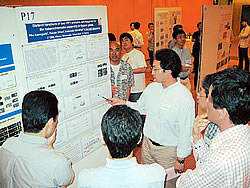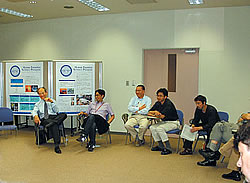RIKEN Four Center Joint Retreat 2006
The RIKEN Joint Retreat 2006 was May 10th and 11th in Atami, Japan-just over two hours from Tokyo. Four of RIKEN's research centers sent researchers: the Center for Developmental Biology (CDB) in Kobe, the Research Center for Allergy and Immunology (RCAI) in Yokohama, and Discovery Research Institute (DRI) and Brain Research Institute (BSI) both at Wako. This Retreat started in 2004 as a series of four joint forums between CDB and BSI held alternately at Kobe and Wako. DRI joined this forum later. When RCAI joined in 2005, the forum became a Retreat to Atagawa on the Izu Peninsula. This location was selected since it was equally close to Kobe, Wako and Yokohama. This year the event moved to Atami.
RIKEN wants to encourage more inter-departmental interaction and collaboration, and the ninety participating researchers attended in the hope of strengthening academic and human exchange that might lead to integrated research projects in the future. In addition to the intense discussions, Q&A sessions sparked lively debates.
Although primarily involving those biology-focused centers, Dr. Katsumi Midorikawa of the Laser Technology Laboratory, a non-biological field, joined the Retreat this year and gave a lecture on Extreme Photonics that many participants enjoyed.
The next Joint Retreat is scheduled for 2008. It will feature topics and programs that continue to foster research and enhance links within RIKEN in addition to motivating collaboration and human interaction. The breadth of interests will widen at the next meeting to encourage crossover projects between all the centers so that collaborations within RIKEN continues to increase.
Making Japanese Science Accessible: Torsten Wiesel
On May 30, 2006, one of neuroscience's greatest heroes dropped by RIKEN Brain Science Institute. It was an official visit. As the Secretary General of the Human Frontier Science Program, he was promoting this largely Japan funded program. He also urged BSI researchers to be more creative and take on risky challenges.
After an official presentation, Dr. Wiesel answered questions from BSI researchers about Human Frontier Science Program. The seminar room was packed, but an information conversational mood permeated the discussion.
"There is so much 'me too' science," said Wiesel in response to a question about funding. Scientists are those who are "able to stumble around, looking for and finding the tools that are necessary to do science." Science, for him is about creating new ideas. "New ideas need novel tools."
Success and failure should not determine the fate of a project, said the Nobel laureate. "Silly ideas do sometimes work, and should be encouraged."
In addition to these ideas for individual researchers, Wiesel had advice for RIKEN BSI on how it could better position itself to attract more international scientists. It is access to information. Information about RIKEN and its labs should be easy to get. Wiesel suggested:
- Creating and maintaining up-to-date websites
- Keeping English sites simple
- Selecting search terms that are commonly used and finding ways to make names more distinguishable.
HFSP website: http://www.hfsp.org/
RIKEN BSI Summer Program 2006
The annual RIKEN BSI Summer Program 2006 kicked off at the end of June as participants from around the world came to BSI to take part in the Lecture Course or Internship. 45 young and promising researchers from 23 countries joined this year, the 8th Summer Program of BSI.
The theme of this year's Lecture Course was "Dynamic states in the Brain". Leading scientists from inside and outside of Japan gave lectures that covered a wide rage of topics from basics to the most advanced research. Over two-weeks, participants and lectures engaged in discussions about science and Japan.
Internship participants joined one of BSI's laboratories for about two months to conduct research that improved their technical skills and expanded their scientific knowledge. Many opportunities to talk with fellow interns and BSI researchers were also provided over the course of their stays. Interns presented posters of their work toward the end of the internship at BSI.
All program participants joined poster sessions during the Lecture Course, which also included a session that introduced BSI laboratories. And, of course, there were several lab tours, too.
BSI's annual Summer Program provide participants with the chance to interact with researchers at BSI and from around the world. The program also encourages researchers who will become the future of brain science and of BSI. In this way, the program expands BSI's international contributions to brain science now and well into the future.
In 2007 the Summer Program will explore "Brain Science: Mystery and Mission" as part of the ten year anniversary of BSI. Details, including a list of the lecturers, and explanation of the application procedures will be available on the BSI website at:http://www.brain.riken.jp/summer.html







